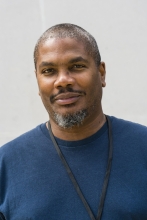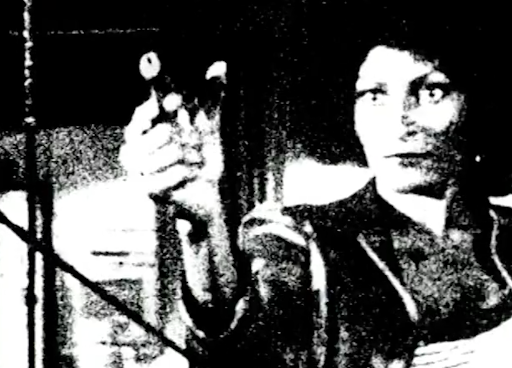
Christopher Harris has been named a 2020–2021 fellow at the Radcliffe Institute for Advanced Study at Harvard University, joining an impressive class whose work will span the sciences, social sciences, humanities, and arts. Harris is Head of Film and Video Production in the Department of Cinematic Arts.
For his Radcliffe project, he will continue researching, writing, and re-photographing original and archival analog film footage as well as creating the sound design for Speaking in Tongues, his 16mm collage sourced in part from educational films, Hollywood films, cartoons, television commercials, European art cinema, and various ephemera. Speaking in Tongues is an experimental film that analogizes the discourse of racialized criminality and the carceral apparatus with the conventions and mechanics of the cinematic apparatus.
As the 2020–2021 Radcliffe-Film Study Center Fellow/David and Roberta Logie Fellow, Harris will pursue an individual project in a community dedicated to exploration and inquiry.

Reckless Eyeballing
“This fellowship class, taking shape amid a devastating pandemic, reflects our conviction that the cross-disciplinary exchange and deep exploration that Radcliffe enables are critically important for Harvard and for the wider world—especially in times like these, when we must confront unprecedented challenges,” said Radcliffe Dean Tomiko Brown-Nagin RI ’17, who is also the Daniel P. S. Paul Professor of Constitutional Law at Harvard Law School and a professor of history in the Faculty of Arts and Sciences.
“Our fellows will advance human understanding in the sciences, social sciences, and humanities. Their creative work will change how we see the world. And they will pursue solutions to some of the most pressing issues facing our society. Their endeavors will be immeasurably enhanced by the unique intellectual cross-fertilization that takes place at Radcliffe.”
The 2020–2021 fellowship year will be virtual, with the possibility of a residential component, pending decisions on Harvard-wide policies by University leaders and informed by epidemiological models of the spread of COVID-19 in the United States. The acceptance rate for the incoming class was 2.8 percent, from a pool of nearly 1,400 applicants. The group represents six countries and a wide range of disciplines.
The full list of fellows is online here.
……………….
About the Radcliffe Institute for Advanced Study at Harvard University
The Radcliffe Institute for Advanced Study is a unique space within Harvard—a school dedicated to creating and sharing transformative ideas across all disciplines. Each year, the Institute hosts leading scholars, scientists, and artists from around the world in its renowned residential fellowship program. Radcliffe fosters innovative research collaborations and offers hundreds of public lectures, exhibitions, performances, conferences, and other events annually. The Institute is home to the Arthur and Elizabeth Schlesinger Library, the nation’s foremost archive on the history of women, gender, and sexuality. For more information about the people and programs of the Radcliffe Institute, visit www.radcliffe.harvard.edu.